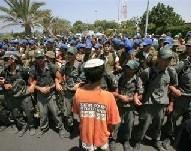“Suicide is bad”. I found myself in the strange position of reciting in mantra-like fashion, what would seem to be an obvious statement. The setting was a weekly informal chat group in my home, where I host post-high school boys as part of a program with a school in my community.
We had just finished watching a movie in which one of the main characters had committed suicide. The character was a bright, healthy, promising teenager with an overbearing father that didn’t understand him. The boy wanted to pursue acting while the father wanted him to focus on his studies, be serious and become a doctor. The family was one of modest means and the father was strict and authoritarian in dealing with the son. From his limited perspective, the boy saw a bleak future and no way out. He couldn’t communicate with his father and didn’t want the life his father was offering him. He went into his father’s study in the middle of the night, and using his father’s revolver, killed himself. The father stirs awake suddenly from sleep by a muffled sound. He races downstairs from his bedroom, not knowing what to expect. The father finds his son in a pool of blood. He crouches and hugs the son’s body, weeping desperately. Finally and tragically, the father perhaps realized the extent of his son’s despair.
In discussing the film with my group, the sentiment arose that suicide is a reasonable solution. This is the point where I had a fit and our discussion became heated.
“What do you mean suicide is acceptable!?” I scream.
“Well, he had nothing to live for…” squeaked one courageous student.
“He had nothing to live for?! He had his whole life ahead of him!!” I retort.
“Yes, but it would have been miserable.” another responded with a bit more confidence.
“Misery may be temporary, but death is pretty final.” I answer.
And so it went, back and forth, until I think I convinced the group that suicide is an extremely bad way to deal with difficulties in life. Just to make sure that the point got across, I summarized the discussion to one line: “Suicide is bad” and repeated it over with them a few times. I had learned from previous sessions that over the course of a long discussion, the boys developed selective hearing and only retained or understood what they wanted, sometimes even the opposite of what had been discussed. Hence the one sentence summaries.
The discussion though, led us to explore what we understood to be some of the roots of suicide: Despair, lack of hope, lack of connection, lack of purpose.
To appreciate light, one must know dark. To know goodness, one must be aware of evil. To find purpose, one must acknowledge despair.
Purpose is the polar opposite of all the things that lead to suicide. Purpose is life just as much as suicide is death. The more a person has purpose, the more alive they are. The more dejected and depressed a person is, the closer they are to the grave.
Throughout my life, I’ve been surrounded by people who were smarter, stronger, wealthier, better looking, more accomplished, more powerful and just altogether better. In comparing me to others, it was cause enough to be depressed and unmotivated. Lacking a defined role in life, feeling there was nothing special or unique that I can do or contribute – I saw no purpose for myself in life, and suicide indeed seemed like quite a logical option. Why burden the world with my presence. Why burden myself with my own depressing existence. And while I was at it, I could heap lots of guilt on the people who though they loved me, I resented at the time as accomplices in engendering my feelings of inadequacy, misery and despair.
Thankfully though, for myself and I expect for countless others, the survival instinct is extremely strong and eventually common sense rules again and we stop feeling sorry for ourselves and move on with life.
But where can one go from the pits of despair? Typically, you can only go up. However, countless people manage to stay in the lower levels of their own personal hell on earth, until they are relieved of life by a ‘natural’ death. Until then, these people ‘survive’, for as I said above, the survival instinct is very strong, but that is the extent of their level of existence.
There is little joy in there lives, little passion. No true connections, no meaning. They have superficial relationships. No goals beyond next months’ salary or the accumulation of wealth. It is a hard and unhappy existence.
Some will have episodes of happiness that intrude upon their somber lives, but will then revert to their former schedule of drudgery. Others will cycle back and forth between periods of normality or even highs, interspersed with times of depression.
More typical is the contented person. Mostly by circumstance and some effort, the contented person has found a certain niche in life. Good relationships. Satisfying work that one is proficient at. He is generally happy and has positive experiences in life. However that person is still trapped. His soul has been frozen. He may get some pleasures out of life, but there is still something gnawing at the back of his mind.
It’s the dreams.
It’s not the nightmares that one should worry about. It’s the dreams that will haunt you to the grave.
Adulthood is about compromise. It’s about being realistic. It’s about being responsible and paying your bills. At an early age, children are indoctrinated into the ‘real’ world. Overt enthusiasm, non-productive interests, and simple sheer irrepressible joy of life are taught to be inappropriate by adults worldwide. Parents are frighteningly successful at educating their children. Children grow up to be just like their parents. Children generally grow up to have the same values, problems and issues as their parents.
But the dreams are still there. It happens when all is quiet in the world. That is when the dream of childhood that has been covered by several layers of adulthood rears its head. It reminds us that we wanted to do something else. It reminds us that we had other hopes and aspirations. Sometimes the maddening thing is that we can’t even remember what the dream was; we just know it’s there.
But circumstances and compromise buried the dream alive. The pressure to make a living, to pursue a career or to raise a family is ever present. We are derailed by a spouse or partner or significant other that has other ideas about life.
The dream doesn’t give up though. When you least expect it and least want it, it keeps you up at night wondering. Wondering what might have been -- what could be. And then you wake up to your reality and go on with life.
Once in a while though, we come across or hear of someone who is actually living their dream. These people are so rare, that one can pass an entire lifetime without meeting such a person. When you do meet them though, you recognize them immediately. They are different. They are typically warm, open, with a quiet self-confidence. They know themselves well. They know their strengths and weakness. And they have found their ‘Mission’. It may be a social worker, an artist, a corporate CEO, a housewife, a scientist, a police officer, a computer programmer. What is different about them is that they have either consciously or unconsciously identified what it is they need to do. And thanks to fate, circumstances and willpower, they have found themselves in the right place at the right time doing the right thing.
It is bliss.
These blissful dream-livers generally radiate energy. They are more alive than your average person. They achieve more. They are unstoppable and uncompromising regarding their mission and purpose, but lay back otherwise. They get pleasure out of their work and can do it endlessly. They typically see themselves as serving others. Any material or personal reward they receive is secondary. The work itself is rewarding.
How does one achieve such a state? How did these people reach that point in life of knowing what they want to do with their lives, of identifying it, describing it and then living their dreams?
Some of them seem to have been born knowing. But that is an infinitesimal minority. The majority of this rare group started out searching and struggling like everyone else. They were the average contented person with that gnawing feeling. The feeling got stronger and they listened to their inner selves more closely. They started taking steps in a new direction. Some had more resistance then others. Resistance comes from the family, from the environment, from the community, from the world and most importantly from inside oneself. They overcame all these obstacles, sometimes at great cost or sacrifice. They demonstrated bravery and developed passion. And they came through changed.
The process forged their strength of character, courage, perseverance, dedication and energy. Once you know and prove to yourself that you have these traits, they stay with you and serve you.
How does one acquire these traits? How does one change the person they’ve become? How does one become a better person? What is a better person?
A better person is one that looks out for more than just his own self interests. A better person is someone who loves. He categorizes his strengths, his talents, his capabilities and determines what he can do for those around him. What can he do for his family, his friends, his community, his world? That person then uses his strengths in discrete specific ways. It may start off as very small, tiny steps – but they have started the journey. By consistently applying oneself, by continually doing more, despite the setbacks and disappointments and frustrations, that person becomes transformed. It may take years. In fact, in most cases it’s an ongoing lifetime effort – but they become a new, better, changed person.
The new person has slowly but surely gained energy via the journey. They have more of a spring in their step. They smile more often. They are irritated less. They are kind and helpful. More people want to associate with them. They have filled a certain important and positive niche in the lives of those around them. They know love. They know true love. And they are radiant.
An interesting biblical personage that may illustrate true love, self-sacrifice and caring for another, is Jonathan. Jonathan was the son of King Saul, the first king of ancient Israel. A brave and daring war-hero in his own right, Jonathan was popular and beloved by the people and the heir apparent to his father’s dynasty. Life seemed glorious and promising for Jonathan, until a shepherd lad named David came along. Because of King Saul’s errors, David was anointed as the next king. David exhibited uncommon courage in fighting and defeating the giant Goliath and further brilliance as a military leader and tactician. King Saul developed a burning jealousy towards David and eventually pursued him around the country with intent to kill. Jonathan by all rights should have emulated his father and looked out for his personal interests, both by defending his father’s crown as well as insuring his own dynasty.
The reverse happened. Jonathan and David struck a true and lasting friendship. Jonathan went against his own self-interests and conspired against his father to protect David from harm. Jonathan openly sided with David against King Saul’s madness, but could not do much to prevent his father’s draining pursuit. He nonetheless remained a dedicated son, and joined King Saul in his last doomed battle against the Philistine enemy where Jonathan along with his other brothers, father and most of their troops were tragically massacred. The caring, the benevolence and the light that was Jonathan were lost forever, and David mourned his personal loss bitterly.
However, the self-sacrifice, the friendship, the love and the model that Jonathan represented were immortalized by the Bible and are remembered more than 3000 years after Jonathan walked this earth.
Why are so few people then truly happy? Why is it so uncommon to find someone who is living their purpose? I think the reason is that by nature, man is self-centered. Babies are born with one primal concern on their minds. Their only concern is themselves. By the time they are toddlers and achieve some understanding, they learn to share – however it is still generally a self-serving exercise. Even into adulthood, most of us learn to have concern and even generosity for others, but often it is ego-centric, done in the expectation of similar treatment, because of social pressures or for self-gratification.
One of the first steps on the road to fulfillment is to stop thinking predominantly about oneself. It is almost a nullification of ones desires. This would almost seem counter-intuitive. I’m going to make myself happy by not pursuing what makes me happy?
Nonetheless that is a key. One has to start thinking about others. To truly care and be concerned, without any thought or calculations about what I’m getting out of it. It is not natural to have or develop that level of sensitivity to the needs of others. The major exception to this is typically the relationship of a mother to their child. However, most of us are inborn with an exclusive sensitivity to our own needs. The needs of others are generally secondary. Love again becomes the key.
Once a person has broken down their continuous self-indulgence and starts looking out for others, they become a receptacle for blessing and the fulfillment of dreams.
There was a famous Talmudic sage by the name of Rabbi Akiva who was asked to summarize the Bible in one sentence. After giving it some thought he stated: “Love thy fellow as thyself – this is an important principle of the Bible”. It’s interesting to note that he didn’t say “Love thy fellow more than thyself”. I expect that he knew human nature enough to know that it’s unrealistic and perhaps even inappropriate. But to have equal consideration, sensitivity, caring and love for ones fellow is both achievable and appropriate. When one realizes the importance of caring for the next person, for one’s spouse, family member, friend, neighbor, associate or even stranger, at the same level as for oneself, then you’ve reached understanding. When you can act on this understanding, then you have begun the steps of change. You are on your way to becoming a better person.
But the human condition is hard to change and easily reverts back to its old ways. That’s one of the reasons Rabbi Akiva kept his advice short and expressed that it’s worth repeating. By repeating to ourselves what we should know, what we should do, we reinforce it. “Love thy fellow as thyself”.
It’s a constant, daily, moment by moment battle between memory and habit. “Love thy fellow as thyself”.
It’s a struggle between whom you’ve been and who you can become. “Love thy fellow as thyself”.
It’s the difference between despair, numbness and futility, versus life, passion and energy. “Love thy fellow as thyself”.
So go out there, raise yourself up from drudgery, discover what you can do for the world around you, look at those around you with new eyes, achieve your dreams and love thy fellow as thyself. Love thy fellow as thyself!







